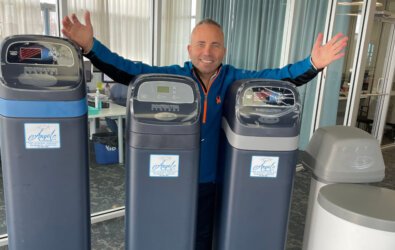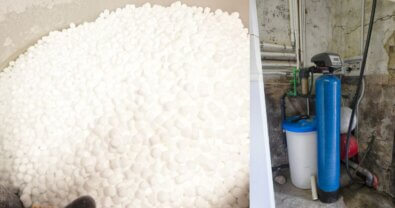17 Warning Signs You Need Water Softener Maintenance Today
In this blog, you will learn:
● There are many water softener red flags to watch out for, including stains on plumbing, dry, itchy skin, using too much salt and more.
● A service technician can help you prevent all of these issues with annual maintenance.
● Angel Water has the licensed experts and experience to help keep your water as soft as can be!
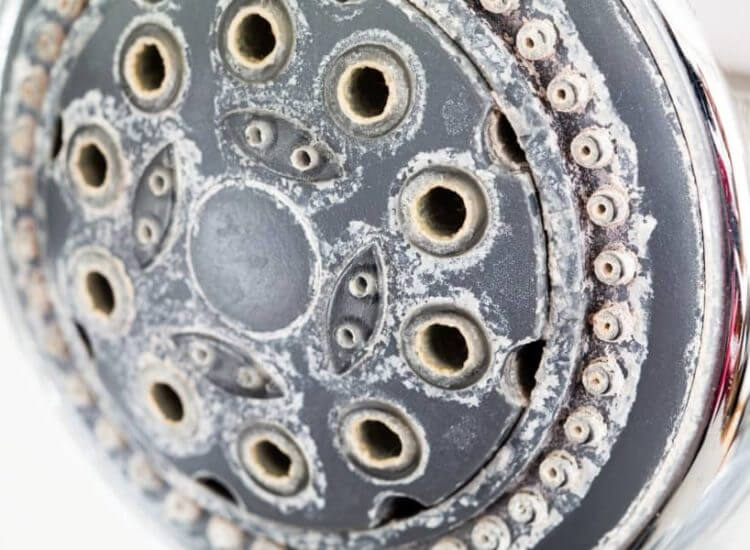
Worried you might need water softener maintenance? We can help you with that! Our licensed experts have mastered water softener service and know all the warning signs to watch out for.
So, if you are experiencing any of the water softener problems on this list, please contact your water filter company or our team. We provide water softener repair in Chicago and throughout the suburbs on all makes and models, including Kenmore, Fleck and EcoWater.
Now let’s review what you should look out for when it comes to your water softener.

Follow Drew’s mission on YouTube
1. There’s White Crust on Your Faucets and Shower Head
It’s hard to ignore this symptom, especially when it comes time to clean your bathroom. As you clean, you will notice these crusty white splotches on your metal water fixtures.
The thing about these splotches is you have to scrub hard to get rid of them. And sometimes, even the most vigorous scrubbing won’t eliminate these stains!
If you have a water softener, these stains shouldn’t happen because they are symptoms of hard water.
When hard water leaves the tap and hits the air, some of it evaporates, leaving behind the excess calcium and magnesium it contains. That’s what those splotches are: crusty calcium and magnesium deposits blemishing your beautiful faucets and showerheads.
Therefore, if these stains occur and you have a functioning water softener, it’s a sure sign something’s wrong. Too much calcium and magnesium minerals are getting through the system, and you need water softener maintenance.
2. Your Toilet Has a Rusty Ring Around the Waterline
Does this sound familiar? You clean your toilet bowl, leaving it looking pristine, only to come back a short time later to discover a rust-colored ring outlining where the top of the water meets the bowl. Why does this keep happening?
Once again, hard water is the culprit. As the water sits in the toilet, it deposits calcium and magnesium minerals along the side of the bowl, making that unsightly ring.
There are two ways to deal with this problem:
- You can keep trying to scrub that ring away whenever it emerges and wind up spending more on cleaning supplies than you would like.
- Or you can get your water softener serviced so that it will resume supplying your toilet with water that won’t leave the dreaded ring.
Clearly, the latter choice will make for a lot less work on your part!
3. You’re Noticing Clothes Discoloration After Washing
Take a look at your wardrobe. Are your white shirts and socks not as brilliantly white as they once were? If they’re beginning to look more orange, then the water you’ve been washing with probably has an elevated mineral count.
Normally, a water softener will lower this count to keep your whites bright and pristine as they should be. But when a system goes too long without proper water softener maintenance, that dress shirt can start looking a little dingy.
Fortunately, there are ways to get hard water stains out. In the short term, you can look for a laundry detergent, which uses chemicals that work well with hard water. And to keep those stains from returning, you can get your water softener fixed by a service technician.
4. Your Hair Feels Brittle and Skin is Itchy After Showering
Not only can inadequately-softened water stain your appliances and clothes, but it can also wreak havoc on your hair and skin. It does this by leaving behind mineral deposits as you shower. Those deposits then dry out your skin and make you itch all over!
The high mineral content can also make your hair more difficult to maintain. You will notice it feels more brittle than usual and tangles more easily.
So, if you’ve been itching a lot recently and your hair has been a mess, then you could have a malfunctioning water softener to blame. The good news is a simple water test can tell you if that is the problem. Even better news: a service technician can make the issue go away!
5. White Gunk is All Over Your Dish Washer Heating Element
Have you noticed your dishwasher isn’t drying your dishes as well as it once did? A faulty heating element may be to blame. Or it could be that the heating element can’t fully heat the dishes because it’s covered with mineral deposits from hard water.
If you’re dealing with the latter scenario, then water softener repair should keep the problem from getting any worse.
In the meantime, you can remove the mineral deposits from the heating element using damp cloths soaked in vinegar. Leave the heating element wrapped in the cloths for an hour. Then remove them and wipe down the heating element with a cloth soaked in water. The minerals should fall away, leaving your heating element good as new. And the soft water from your newly serviced water softener will keep the problem from rearing its ugly head again!
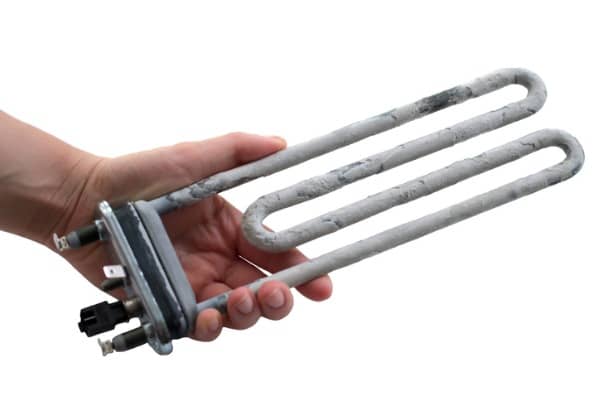
6. You Have Cloudy Dishes After You Wash Them
When water is not soft like it should be, it makes a chore like doing the dishes even more of a chore. The water leaves behind excess calcium and magnesium deposits on your silverware, glasses and plates, making them look cloudy even after you wash them.
And to make matters worse, cleaning the dishes again doesn’t always fix the problem. In fact, adding more detergent can exacerbate the issue and leave the dishes looking even cloudier!
So, rather than continuing to try to clean with water that is too hard, we recommend checking on your water softener. By fixing the issue there, you can start rewashing the dishes without worrying about a spotty finish.
7. You’ve Been Using More Soap and Fabric Softener Lately
As we’ve established, water softener problems tend to make washing dishes and clothes less efficient. After all, it’s hard to get the results you’re looking for when the water is compromising the quality.
One common side effect of this issue is increased spending on dish soap, laundry detergent and fabric softener.
Therefore, it’s a good idea to pay attention to how many of those products you’re using. If you notice you’re adding more to each load than usual, then that could be a sign you need water softener maintenance. And if you’re spending more at the store as a result, then it will be worth it to check if a simple fix could save you money.
8. You Have to Replace Salt Too Often
Salt-based water softeners require regular salt replacement to function correctly. A newer softener typically needs salt replacement every 6-8 weeks, and older units need salt every two weeks.
However, when you find yourself adding more salt more often and it doesn’t seem to be helping, then your softener probably needs maintenance.
Sometimes this problem stems from too much salt being used during regeneration. In this case, your system will need to be recalibrated to use the right amount of salt. Other potential sources of the issue include a leaking valve-head or overflowing brine tanks.
Whatever the issue is, a service technician should be able to fix it and get your salt usage back to where it should be.
9. Your Water Softener is Not Using Salt
Just as it’s a red flag if you have to replace salt too much, it’s also not good if the salt level hasn’t changed in months. When your water softener is not using salt, it may indicate that you’re dealing with a salt bridge.
Want to get more helpful water information delivered to your inbox?
Sign up for our free email newsletter!
A salt bridge is a solidified layer of salt that can form at the top of the brine tank in a water softener. It often develops in areas of higher humidity, which causes the salt to bind together over time. This hardened layer makes it impossible for the system to regenerate and leads to hard water getting into the home.
One area in which we frequently see salt bridges is the humid climate of Southeast Florida. Angel Water recently opened a location in West Palm Beach, and salt bridges are one of the most common issues we’ve encountered on our service calls.
Fortunately, performing water softener maintenance to fix the salt bridge is relatively easy. It requires breaking up the hardened salt layer with a blunt tool, such as a broom handle or hammer. However, you should do this with care to avoid damaging the system.
Once you break up the salt bridge, you should run a regeneration cycle to get the softener working again. We recommend doing this at a time when few people in the home will be using water.
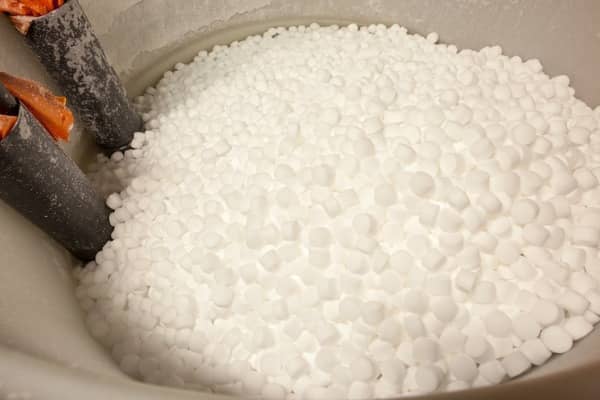
10. Your Water Softener is Leaking
It’s a good idea to regularly inspect your water softener to make sure everything is in working order. One warning sign to watch out for is water puddling around the system. This likely indicates that there’s a leak somewhere.
There are many spots water softener leaking can occur, including the brine tank, the valves, the hose and the drain line.
If you wish to identify where the leak is coming from, we strongly recommend turning off the unit’s power and disconnecting the water supply to avoid being electrocuted. However, a service technician can safely do this for you and apply best practices to fix the issue.
11. Your Water Looks Discolored
Sometimes a malfunctioning water softener will make its presence known by turning your water an unpleasant color. If the water looks brown, orange or grey, this could be due to too much iron or manganese in your water softener system.
However, this discoloration could also be coming from other sources besides your water softener. For example, too much sediment, rust from old plumbing and flushed water mains can also lead to unsightly tap water.
A service technician can perform a water test to determine if your water softener is the cause of this discoloration.
12. Your Water Tastes Salty
Salt should never escape from your water softener. But when it does, you will start to notice the salty aftertaste pretty quickly.
This often happens because the softener accidentally leaks salty water into a home’s plumbing during regeneration. However, there are many other potential causes, including clogs in the injector or the brine line.
Not only is this extra salty water unpleasant to drink, but it can also damage your plumbing. Therefore, it’s essential to contact a service technician right away if you have this water softener problem.
13. There’s Something That Looks Like Sand Floating in Your Water
Those tiny particles floating in your water could be sand or another contaminant. However, they could also come from your water softener.
In this case, the particles are not sand at all but rather resin beads that have escaped the resin tank. These beads function to remove calcium and magnesium from the water, but they should never find their way into your glass.
If the resin beads are escaping your water softener, your water softener screen has likely worn away and will need replacement.
Not only can these beads muck up your water, but they can also clog up your plumbing and damage your water heater if the problem persists. So, if you notice this problem, be sure to order water softener repair right away.
14. You’ve Been Going Through a Lot of Water Heaters
Similar to how they can suppress the heating element in a dishwasher, minerals from hard water can also make water heaters less effective. Calcium and magnesium will cake over the heating element in the water heater, making it less effective and causing it to break down sooner.
So, if you find yourself having to replace your water heater every few years, then water softener maintenance can help with that problem.
15. Your Heating Bill Has Risen Significantly
One final way a faulty water softener can hurt you is in your pocketbook. This is because hard water makes it harder for appliances like dishwashers and water heaters to do their jobs. As they work extra hard to try to heat the water, your utility bills will rise. Indeed, we’ve seen utility bills go up as much as 30% because of hard water!
For that reason and all the others listed above, the cost of expert water softener repair is totally worth it! Not only will it help you financially, but it will also help you live more comfortably and happily in your home.
16. You Live in an Area with Well Water
If you have well water, then you will likely experience many of the issues on this list at some point. The reason for this is well water receives no municipal water treatment. Instead, the water from the ground is what enters your home. And in regions like Northern Illinois, that groundwater collects many hard water minerals, like calcium, magnesium and iron.
Because of this, water softeners in homes with well water must work extra hard to remove all those minerals. And the harder the softener has to work, the sooner it will need maintenance. Therefore, we recommend water softener service at least once a year for homes in towns with well water, such as Arlington Heights, IL, and Bensenville, IL.
17. City Water Can Be Hard as Well
Unlike well water, city water receives municipal treatment, which provides some protection from contaminants. However, this treatment does not keep the water from getting hard. In fact, many cities with city water have some of the hardest water in their regions. For example, Crystal Lake, IL, has a hardness level of 138 mg/L for its city water, which is extremely high.
We provide regular water softener repair for many homeowners in Crystal Lake because the very hard water makes it necessary. So, be sure to watch out for the red flags on this list if you have city water.
Water Softener Maintenance Can Prevent These Woes!
As you can see, it’s no fun to discover you need your water softener serviced. Therefore, the best strategy for avoiding these problems is scheduling regular water softener maintenance. That way, you can prevent these issues before they occur!
At Angel Water, we have been servicing water softeners in Barrington and the surrounding region for over 50 years. In that time, we’ve worked with everything from Kenmore water softeners to cutting-edge EcoWater models. As a result, we’ve found that the best way to keep your softener working well is by having it serviced at least once a year.
Do you need your water softener serviced? We would love to help. Please visit the page below to learn more about our services and schedule an appointment. You can also call us at 847-382-7800 to speak to an expert.
Editor’s Note: This blog was originally published in June 2021 and updated in December 2021.
Interested in a Water Softener System for Your Home?
You don’t have to live with a dry, itchy scalp and brittle hair anymore! It would be our pleasure to help you find the right water softener to make your showers enjoyable again.
Please give us a call at (847) 382-7800 or visit our water softener page to learn more.

